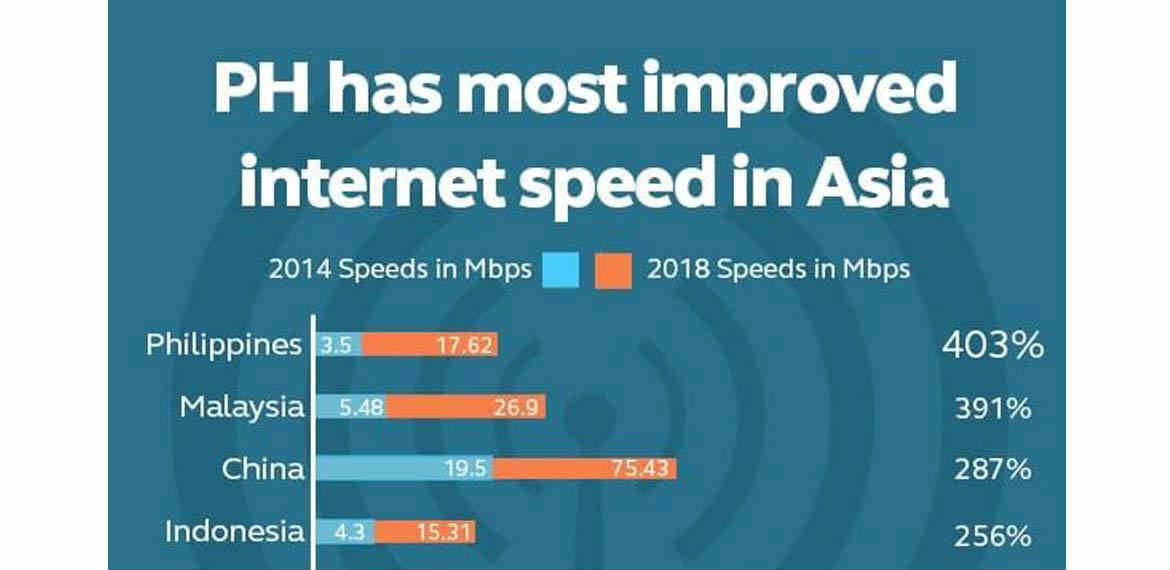In reaction to latest news reports and blogs about the speed test results in the Philippines, Globe reiterated its commitment to improve internet speeds and the overall quality of experience (QoE) of internet services. The Philippines is now the most improved country in Southeast Asia when it comes to Internet connection, clocking 5 times faster fixed broadband download speeds according to a recent infographic released by Yugatech using the latest Ookla data.
The new infographic is a welcome update to previous infographics portraying the country as Asia’s laggard. Based on the 2018 report by Ookla, the average fixed broadband download speed in the Philippines is 5 times faster than in 2014.
According to Speedtest Global Index Report by Ookla for April 2018, fixed broadband download speeds have increased dramatically by 403% to 17.62Mbps as of April 2018, from 3.5Mbps in 2014. The country is followed by Malaysia with 391% improvement.
For mobile, average download speeds in the Philippines continued to improve from May 2017 to April 2018, according to a Yugatech report citing an Open Signal data.
Globe was able to retain its position of having the widest 4G availability as its users were able to find its 4G connections 67.5% of the time, the report read.
“These consistent reports from Ookla and other crowd sourcing speed tests showed that our high network investments have started to pay off. We were able to improve our internet services by efficiently using our spectrum assets and improving our network continuously,” Joel Agustin, Globe SVP for Network Technology Group, said in a statement.
Globe Telecom is allotting $850 million to $900 million every year until 2020 as capital expenditures (capex), in a bid to continuously upgrade its network for its fast-growing data business.
In the first 3 months of 2018, Globe already spent around P6.6 billion to remarkably expand its network and support the growing subscriber base and demand for data.
In terms of wired broadband facilities, Globe was able to deploy fiber broadband in 12 cities in Metro Manila as well as in 19 provinces nationwide. Majority of the company’s fiber build are located in Quezon City, Sta. Rosa and Calamba in Laguna as well as in Cebu and Davao.
Globe continues to deploy VDSL and now includes 16 cities in Metro Manila and in 18 areas that include Bulacan, Cavite, Baguio, Cavite, Cebu and Davao City. VDSL technology provides high-speed Broadband service up to 200 Mbps using existing copper footprint.
Agustin said that the total deployment using various broadband technologies reached more than 1 million lines since 2016. The company’s bid to deploy 2 million broadband lines by 2020 is expected to redefine home broadband experience for Filipinos amid growing customer demand for bandwidth-intensive multimedia content.
Using the 2600 MHz, Globe also fired up almost 200 massive MIMO sites, enabling a mobile network to multiply the capacity of a wireless connection without requiring more antennas.
The company’s deployment of massive MIMO technology has also been working to accelerate the company’s bid to roll out 2 million home broadband lines, with speeds of at least 10 Mbps by 2020. “The goal is to provide for the growing data service needs of our customers and the company will continue to aggressively roll out broadband lines using latest available technologies such as the massive MIMO,” he said.
In early 2017, Globe started the commercial deployment of massive MIMO to enhance mobile internet connectivity experience of customers in high-density areas. The commercial deployment of the MIMO technology forms part of the company’s efforts to further improve mobile and wireless broadband internet experience of its customers by expanding on its network coverage and capacities.
Globe continues to be aggressive in expanding its LTE coverage across the country by deploying additional 934 LTE sites using the 700MHz, 2600 MHz and 1800 MHz frequencies in the first quarter of the year including Jolo, Tawi-Tawi, and Batanes.












